Forever Love Foundation (FLF) is a California-based non-profit charitable organization that was founded in 1996 and which has been operating programs within Thailand since 2000. It was founded by Malissa Behring, a Thai-American citizen who, although she had grown up in the U.S.A. since she was 12 years old, she has still kept close contact with her roots in the Phathumthani province in southern Thailand.
The mission of FLF operates to provide assistance to the underprivileged children in rural Thailand through the areas of education, health, and social development projects. The ultimate goal of the FLF is to ensure that underprivileged Thai children are equally able to participate in learning opportunities that will better prepare them for a successful life as young adults. Some of the projects supported by FLF include student scholarships, restoration of disadvantaged schools, and employment and training of teachers in rural schools.
“The story behind the Forever Love Foundation began back in 1990 as a loving memory of a little boy who was homeless and very ill,” explains Malissa, the president of FLF. “Our paths crossed on the streets of Bangkok in 1990, where I discovered that he had been orphaned by HIV which he had also received from his parents. Through this one child I became aware of the impact the AIDS epidemic was having on the children and the magnitude of their suffering in my country. The boy died shortly after I met him, but his memory remained with me and grew stronger as time passed. I was inspired by this special boy and his fate deeply touched my heart. Ultimately, the need to do something became so powerful that I chose to commit my life’s work to helping Thai children.”
More than two decades later, the FLF has brought great contributions to those in need. Among their past achievements, it is certainly worth mentioning their partnership with the Thai government Department of Social Development and Welfare enabled them to distribute over 10,000 wheelchairs to disabled people in all rural areas throughout Thailand. Currently, the Foundation is renovating seven rural schools in Nakorn Nayok and Phathumthani Provinces, as well as in locations throughout Central Thailand that were affected by the 2011 floods. “The renovation projects include building libraries, bathrooms, classrooms as well as designing classroom activities to help the students to gain hands-on knowledge of the world around them,” said Malissa.
However, it has definitely not been an easy journey. Some of the major frustrations the FLF have encountered had to deal with the Thai government bureaucracy that, in Malissa’s own words, “seems to strip us of our time with reports and reports which suffocate our passion and creativity for the work that we need to do.” On top of that, if one adds graft, corruption and dishonesty in the school system as well as in dealing with the local politicians, then one can easily realize that helping people is not as easy as it might seem. Then there is also an apparent severe lack of funding by the Thai government for the poorer rural schools and not enough skilled teachers assigned to teach and run these schools which are mainly located very deep into the countryside.
Today, many children, particularly the children of ethnic minorities, migrants and the children of very poor families have missed out on the benefits of Thailand’s economic growth. A large number of these children still face a great number of obstacles in claiming their basic fundamental rights to protection and education. Many children still do not, or are completely unable, to complete a primary school education, and many more do not go on to secondary school because of the need for them to help out their own families’ needs in order to make ends meet, which tends to force children to stay at home.
“I have not seen much change in the situation faced by the underprivileged children in Thailand, from my generation to the new one,” affirms Malissa. “Exclusion from education, trafficking, child labour and other forms of exploitation that children are confronted with are still rampant and directly afflicting kids physically, mentally, and emotionally. A growing economy and the changes that come in its wake have also conveyed a multitude of new challenges for children in many areas, such as the spread of HIV/AIDS, the break-up of traditional family structures and a rising toll of child deaths from sexual abuse, drugs, abduction, and other death misfortunes.”
For those children who are in school, there are still serious concerns over the quality of the education they receive and whether it is relevant to their needs now and later in life. The challenges in rural schools are often at least as great as those in urban schools. For example, just like their urban counterparts, rural schools are also often poor but unlike urban schools, their populations are sparse, which presents additional challenges. Put together, this can lead to greatly reduced educational opportunities.
“Every part of Thailand has its pockets of poverty – even in the big cities like Bangkok. With the government going through so many changes in the last few years, there has not been a lot of support for the underprivileged in Thailand. The few programs that the government has put into action such as the rice subsidies, palm and rubber oil, and the computer tablets have not been successful so far,” admitted Malissa. “The poorer communities in the north and the south have seen little change in the last few years as the cycle of poverty continues.”
Furthermore, once the ASEAN Economic Community (AEC) is introduced in 2015, the risk for migrant families will become potentially higher with more people seeking a better life elsewhere, including here in Thailand. For many children, their fortunes, and thus their futures are tied to that of their parents. “Migrants continue to face challenges and difficulties as they are denied their fundamental rights and are exploited and left vulnerable and these will open up for abuse, exploitation, and diseases. More problems to come, and the government and its citizens will need to be educated and prepared for the outcomes of the AEC” exclaimed Malissa.
The sad truth is that the present Thai Government has been so busy trying to stay in power (and this goes for both major parties) that they have spent very little time on trying to help and support the poor and underprivileged of their very own country. The FLF is a small foundation with very limited resources which are used to help the poorest communities that simply do not receive any genuine help from other areas. “Being poor, attending school where the best teachers don’t want to teach, and having a limited set of courses on offer is not a prescription for academic or vocational success,” concluded Malissa. “Much more needs to be done!”
Forever Love Foundation remains committed to supporting underprivileged children in Thailand and, at the moment, there are no plans to expand their assistance to other Southeast Asian countries. Still, there are many ways how people can help, and it doesn’t necessarily have to be based on just donating money. You can also volunteer your skills and your time to help schools that are in need of assistance. You can also donate used (or new) school uniforms, books and other educational supplies, or you can even financially sponsor a poor student to attend classes regularly at his or her rural school. Get involved today by visiting the FLF website or contacting them at foreverlove[at]forever-love[dot]or[dot]th. The message is this: “Make Happiness Real for Those in Need!”
A shorter version of this article was initially published in Mango Metro (March 2014, Vol.8, No.4)
Continue browsing our Forever Love gallery:
[nggallery id=37]
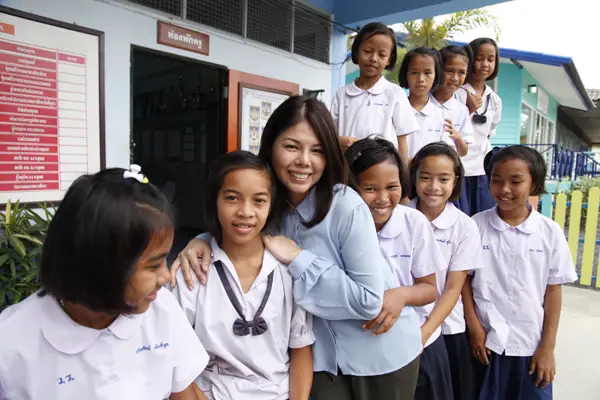
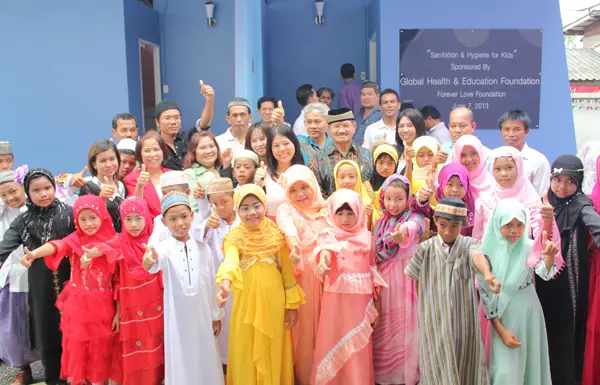
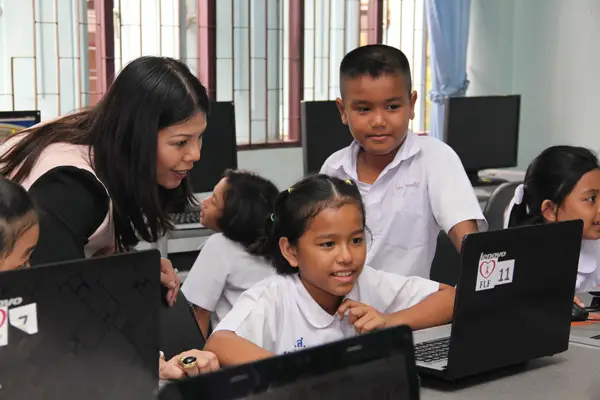
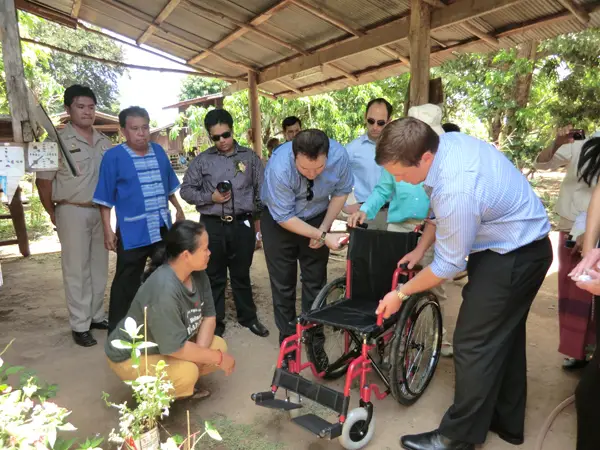
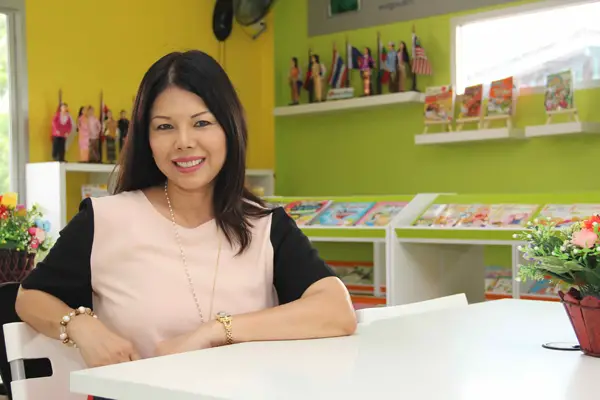
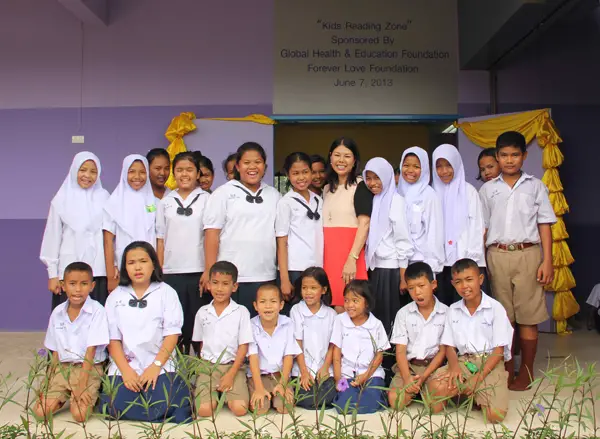

This is for Malissa Behring’s eyes only. Malissa, this is Roger Barwise, your old next-door-neighbor at Park La Brea. How are you? I have been living in Korea for the past four years and I have visited your Forever Love website from time to time. I greatly respect what you are doing there in Thailand.
Please let me hear back from you. I am what I call a rather permanent resident of Korea, since I haven’t been out of this country in four years and have been married to a Korean citizen for 15 years.
But, please let me know how you are. I was a teacher for L.A. Unified School District for 11 years from 2001 until 2012, then we move back here to Korea, my wife’s home country and birthplace.
Very Best Regards,
Roger Barwise